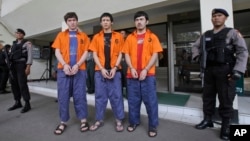Indonesian officials estimate there are between 200 and 300 IS sympathizers in country
Islamic State (IS) claimed responsibility for carrying out Thursday's coordinated bomb and gun attacks in Indonesia's capital Jakarta that left seven people dead, including all five attackers.
According to reports, IS has been recruiting in Indonesia, the world’s largest majority Muslim nation. Hundreds of Indonesians have left the country to join the group in Syria. Here’s a look at IS activities in Indonesia:
Q: How long has IS been active in Indonesia?
According to Greg Fealy, an associate professor at the Australian National University who studies terrorism in Indonesia, the IS terror threat in Indonesia has been rising since mid-2014.
Al Chaidar, a faculty member at the University of Malikussaleh in Indonesia, told VOA’s Indonesian service in November that there were many IS sympathizers in Indonesia, though he did not have exact numbers.
Indonesian officials estimate there are between 200 and 300 IS sympathizers in the country.
The chief of Indonesia’s counterterrorism police, known as Detachment 88, said at a seminar in December that IS had repeatedly threatened to attack Indonesia, including after the IS attacks in Paris in October.
A man claiming to be an IS leader in Indonesia, who goes by the name of Santoso, threatened to attack the Jakarta police headquarters and fly the black IS flag over the presidential palace, while another IS member, Salim Mubarik Attamini, has also vowed to attack the country.
Q. How many Indonesians are fighting with IS in Syria and Iraq?
Hundreds of fighters from Indonesia have reportedly traveled to join IS in Syria, including those with families who news reports say want to live in an “Islamic country.”
Indonesia’s counterterrorism agency said in December that as many as 384 of the nation’s citizens have joined IS.
Chaidar, however, believes that about 611 Indonesian are now training in Syria and that some of them have returned.
Q. How many Indonesians have returned home after serving with IS?
There are conflicting reports about the exact numbers of Indonesians who have returned. Government reports suggest anywhere from 169 to 300 Indonesians who fought for IS have returned home.
According to counterterrorism officials, eight returnees were arrested in recent months for fighting alongside IS militants on the frontlines of the war in Syria.
Q. How is IS funded in Indonesia?
Indonesian officials say they have tracked a network of funding for terror coming in and out of Indonesia from across Southeast Asia.
“Some of the money may be used to initiate activities that support IS and terrorism activities or to finance aspiring militants' trips to Syria to join IS," Ade Bhakti, executive director of the Jakarta-based Center for Radicalism and Deradicalization Studies told the Bangkok Post.
The Australian and Indonesian authorities discovered that the equivalent of about $450,000 was transferred from a suspected terrorist cell in Australia to Indonesia. The money is allegedly being used to fund terror in Indonesia.
Q: How is Indonesia fighting IS?
In order to counter the terrorist threat, the Indonesian government is pursuing a two-pronged policy of law enforcement operations and de-radicalization programs.
Since most IS members in Indonesia are young, the country’s counterterrorism agency is trying to involve young people in a counter-radicalization drive and peace programs.
According to country’s minister for law and security, the security and intelligence agencies have increased coordination to deal with potential threats from IS.
The minister, Luhut Panjaitan, told reporters that the government is planning to take a soft approach toward alleged IS sympathizers, in contrast to Western counterterrorism practices, which he said have proved unsuccessful.
Meanwhile, security forces last year conducted operations to hunt down the Santoso group aligned with IS in the northeastern city of Poso.
In raids conducted against suspected IS affiliates in the Central Java city of Solo, security forces found IS paraphernalia, such as black flags and T-Shirts with IS logos .
Still, Chaidar said Indonesian law enforcement's counterterrorism measures are largely weak and ineffective.
He said that eight cities in Indonesia known for radicalism could be targeted by IS, including Jakarta, Surabaya, Medan, Lombok, Balikpapan, Tangerang, Depok and Bekasi.




